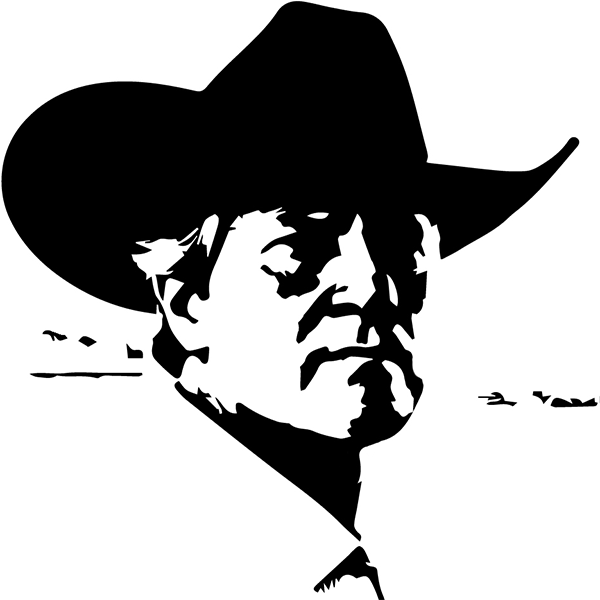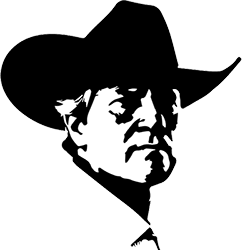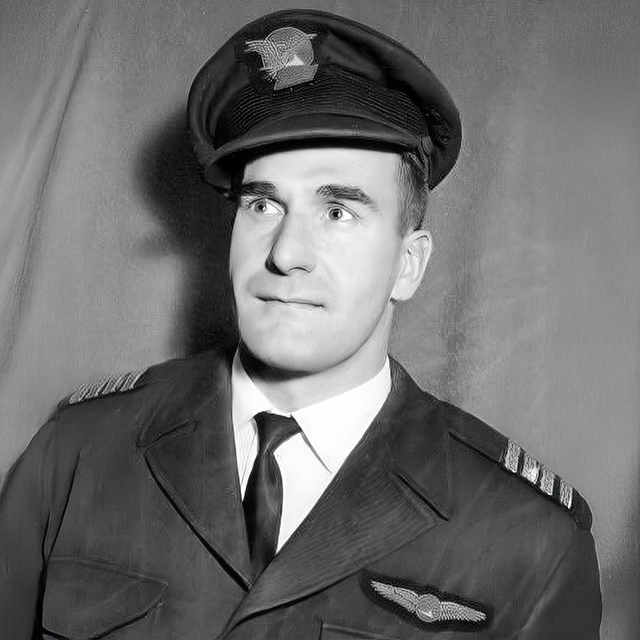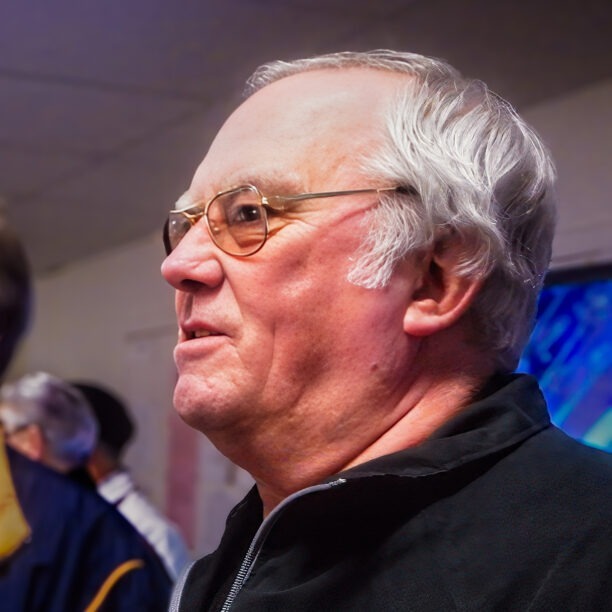In Loving Memory of Lorne Alfred Goulet.
I phoned my older sister Janice on December 21st to wish her a happy birthday. Because the day she was born, December 21st, is not only the first official day of winter but also the shortest day of the year, I feel that the special meaning of her “birth” day can get lost in the final countdown toward Christmas. I don’t always get her on the phone, but I did this day. We talked about the usual things a sister and brother who don’t spend time together would speak about, such as family. Her focus for the past (I am not sure for how long, but let’s say) 3-5 years has been on “our father not yet in heaven.”

Dad, as we still call him for lack of a better term, had been in the Deer Lodge for the last few of those years, suffering health and memory problems. So when I call Janice, she always updates me on his condition and some of the funnier or worrisome antics he pulls off during his senior moments. Unfortunately, the troubling stories outnumber the humorous ones more and more.
Her report this time was very positive as they had been out for dinner last night with Dad, and he was doing fine. They talked about god and heaven and what would happen to him in the end, but then he joked that he should at least stick around for her birthday tomorrow. I joked that if he was considerate, he would wait until after her birthday or even until after Christmas before passing on. He had been up and down many times in the past few years; for all I knew, he could easily live another 10 years.
I am always amazed, however, at how diplomatic Janice is in her depiction of his various conditions and moods and at her genuine concern about his ultimate health and quality of life. Not that she shouldn’t care, but that she still cares says more about her than it says about him.
I still call Lorne “Dad,” although he quit (as in “resigned”) from being our Dad 40 years before when he abandoned our family to start a new one. I never begrudge him that decision, although I still say it wasn’t his decision, and I do not harbour any ill will toward him or his second family.
He ceased being my father the day he left us to struggle on our own. I failed high school that year of the messy divorce, but lucky for me, I was wise enough to understand that I could not use the divorce, indulgence in self-pity, or lack of parental support as an excuse for failure. When I turned 18, I realized I needed to make it independently without my parents.
Ironically, I learned that from Dad. Not deliberately, as in he took the time to think about what he wanted us to learn, but because he, out of pure neglect, left us to our own devices so many times in the past we had learned to be or survived to be, very independent without him as opposed to because of him.
I love to tell a story about when he left Janice and me at Maskwa Lake for three days alone. I was about 12 years old then, so she would have been 13 and a half. In those days, Maskwa was a remote fly-in location with wolves and bears and all the other realities of the wilderness. Dad flew us back and forth to our rice lake with his floatplane, a 90-hp 7EC Aeronca Champ.
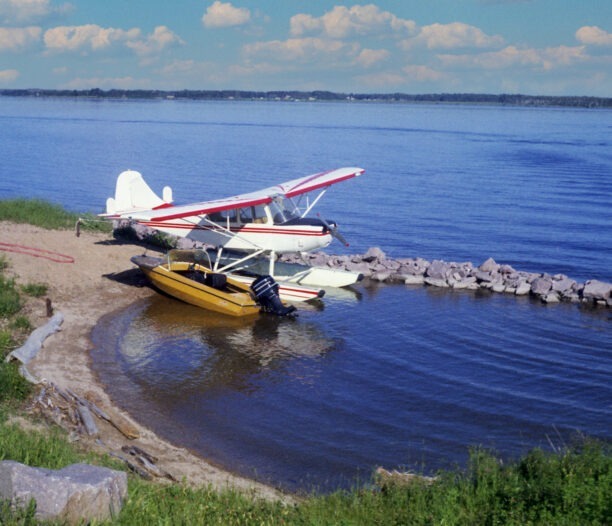
Dad, Janice, and I were tenting on a large island during the wild rice harvesting season, where there was less chance of a bear wandering into camp. We were running low on supplies and food, so Dad decided to fly into Lac du Bonnet to replenish. Usually, there would have been other friends or workers at the camp, but it was just the three of us. He left us behind to ensure room in the little floatplane for the groceries. At least, that is what he told us. It was supposed to be only one night, but the second night came and went, and the third day rolled around.
By then, there was no food left. Janice was eating the last cornflakes dry right from the box. I had caught a jackfish, and although she wouldn’t have touched my swamp water fish anyway, it tasted too fishy; I needed a fire to cook it.
We had used all the burnable wood on the island, so instead of taking the canoe and outboard motor to the mainland to fetch dry firewood, I decided to fell the last standing dead tree near the camp. It was a rugged old pine, which would be difficult to cut down with no chainsaw, but the wood would burn beautifully.
The only problem, and the reason it was still standing, was that the tree was across a narrow gully. Finding a balanced footing and swinging the axe safely would be difficult. Between the lure of fish dinner, the cold autumn nights, and the need to keep Janice’s wolves at bay, I knew I must tackle the old pine tree head-on.
I remember straddling the gap between the Precambrian granite rocks and leaning back to position my axe for the first swing. The swing went badly, the axe glanced off the weather-hardened pine tree, and I barely managed to regain control. Janice freaked out, watching me balance on the rocks with this big gangly axe swinging about.
To this day, I don’t remember how I did it, but on the second swing, the axe came crashing down on my head, leaving a long, gushing split along my scalp.
Janice, who has always been squeamish around blood and guts, was left with a semi-conscious, severely bleeding younger brother. Because I am still here to write about it, it tells how quickly she got her act together. My hair and the back of my shirt were already soaked in dark red blood. My scalp bled profusely until she got me back to the tent and slowed the bleeding by applying pressure. What I really needed was stitches. We were alone at the lake with no communication and no way out. My chances of surviving the night did not look good.
The end-of-summer days in late August were still relatively long, but that day was the longest. Just before sunset, however, we heard the drone of the little Champ. Lorne landed on an open stretch of water and taxied the floatplane up to the island, heeling the plane onto a flat rock.
He quickly realized that I needed to get to the hospital. It is illegal to take off or land a floatplane on the water at night, but he stuffed us both into the back seat of the Champ and flew to Lac du Bonnet in the dark. Lorne radioed ahead and instructed the RCMP to shine their car’s headlights onto the lake for the water landing. The police then rushed me to the Pinawa hospital, 30 minutes away. I very clearly remember the doctor sticking a needle into my head to numb the pain and then proceeding to suture my scalp with a row of Frankenstein stitches.
Dr Beaumont said I was lucky to have such a daring, heroic father and brave Nightingale sister. They most likely saved my life. The irony was that Mom did not know Dad had gone AWOL for three days and was not at the lake with us when the accident happened. He spent those three days somewhere else but not at home. We never got an explanation, an apology or even a hug. Lorne was not a hugger.
I always get a nervous laugh when I tell that story in the bar. I have had guys repeat the story to other blokes in other bars years after I told it the first time. This is how memorable it is to them. They never had any such story to tell about their fathers. My problem is that most stories involving my father end in calamity. I have enough stories about being abandoned at Wild Rice Lake or some remote northern location to fill a book.

Again, I bear no ill will. I loved my father despite him not really knowing what that meant or him being able to reciprocate. When I was much older, I tried hugging him. His arms would dangle by his side, not knowing how to hug back. But when you see the dashing airline Captain in a starched white shirt and a smart navy blue suit sporting four gold bars, you don’t see the hard work that went into the making of that man.
Lorne Alfred Goulet left the Bird River farm at seventeen and enlisted in the Winnipeg Rifles to fight a European war. He fought his way from Normandy to Holland, was shot through the arm, evacuated to a hospital in England, rejoined his regiment, captured a pill box of Germans, won a medal, returned home safely to the farm on Bird River, got married, built Tall Timber lodge, lost Tall Timber Lodge and his medals in fire, learned to fly, bought a plane, crashed his plane and broke his leg, leased a wild rice lake, invented the airboat to pick wild rice using the engine from his crashed plane, had three children, joined Transair and survived as a pioneering bush pilot to become a regional airline captain.
My father’s bush flying days in 1950s northern Canada were a relentless test of grit and endurance. The day started on a -40°C morning on a wind-whipped frozen lake, crouched over a stubborn glow pot, desperately trying to coax life into an engine locked like a block of ice. Summers brought no respite, as clouds of black flies and bloodthirsty mosquitoes swarmed relentlessly while Lorne hoisted 400-pound fuel drums and crates of supplies into the bellies of PBY Catalinas or DC-3s, shoulders aching and fingers raw. Meals, if they could be called that, were often little more than stale hard black bread and pork fat and moose meat sausage wolfed down between flights. There were no GPS, satellites, or mobile phones and few rudimentary navigation aids. Navigation was done with a map and a compass and, in the Arctic, a celestial compass. Holidays and birthdays were spent in remote outposts, and with no way to call home, the isolation cut sharper than the cold. His life was the road taken.
In his time, it was a damn tough road to becoming an airline captain.

Oh, what a lucky man he was.
I have always said that because he was away so much, being a pioneer northern bush pilot and later an airline pilot, I never had a father to teach me the skills a young boy needed. I taught myself or found mentors: Boy Scout leaders, priests, friends’ fathers, and my godfather. Skating, playing hockey, gun safety, hunting, fishing, canoeing, and flying are all the things a bush pilot father should teach his son or at least bear witness to.
Instead of a father, however, I had something that worked just as well. I had a father figure. Someone who I looked up to and who represented the kind of person I should or should not aspire to be. As a bush pilot for Transair, flying the Noorduyn Norseman, the Bellanca Airbus, and the PBY Canso and then working his way up to flying the DC-3, DC-4, YS-11, Hawker Siddeley HS 748, and finally Captain on the Boeing 737 my father represented a man everyone could admire. Lorne was the poster boy of a new era, a clean-shaven Captain of the sky, a leader of men, and a sober family man.
That is the man I looked up to as my father figure, but simultaneously, I aspired to be someone totally different. I wanted to learn from his mistakes, even if he could not do so himself. I became as much a product of my not wanting to be like my father as I was not being able to prevent myself from being like my father. There are some traits, learned or inherited, I simply cannot control, but I am not afraid to be my father’s son for those qualities I do have power over. For the most part, that has been a good thing. The memories of hunting, fishing, canoeing, flying and harvesting wild rice will be with me all my life like the memories of WWII were with my father all this life. Those were my formative years, and I am who I am because of the adventures and misadventures my father led me into.

And there were the good times. Lorne always made it home for Christmas despite missing our birthdays and school holidays. The first task was for Dad and the kids to pile into our VW Beetle and tramp through the deep snow and thick forest to cut down a spruce tree. Dad would pull the tree out on a toboggan with all three of us piled on top, lash the tree to the top of the Beetle and make our way home singing Christmas carols. Once Dad set up the tree, everyone helped decorate it with homemade and store-bought ornaments. Then, the beautifully wrapped presents would appear out from secret hiding places (none of us kids could find despite many nights on the prowl) and overwhelm the tree. Our family was never short of modern, thoughtful presents.
Christmas morning was magical but disciplined. Mom saw to that. We couldn’t open presents until Grandma Alksne (and Grandma Goulet, if she was around) came to our house. One of us children would be designated as the present bearer, find and read out the tags, and personally deliver each present one at a time. Christmas gift-giving was very organized, with the goal being that everyone knew who got what from whom and would adequately thank them, usually with a quick kiss on a blushing cheek, before the next present would be handed out. We were genuinely thankful for Christmas and our family time together.
Our Christmas day dinner table was loaded with roast turkey, sage-infused stuffing, mashed potatoes and butter, rich brown gravy, high-bush cranberry sauce, wild rice casserole, Swedish meatballs, deviled eggs, perogies, freshly baked dinner rolls, mince meat pies, butter tarts, and shortbread cookies covered in coloured sprinkles. Mom would serve non-alcoholic wine at dinner, and we would giggle at the thought of having a sip.

If my memories of Christmas are of an idyllic family life, they were. Neither Mom nor Dad drank. Times that Dad spent at home were sober. He spent his spare time working on his airplanes or the wild rice harvesters. We flew out to our favourite lakes for fishing and hunting. I never remember him being mad or raising his voice. His idea of teaching was simply to do it himself. I wasn’t expected to figure out how and when I should attempt to emulate him. If I didn’t, then that would be okay as well.
As I talked to Janice on her birthday, she received a call on her mobile phone. Dad has no pulse; they are rushing him to the hospital. I knew Lorne had done it again. He left Janice and me alone with nothing but a story to tell. Maybe that is the answer to the question he asked. What would happen to him in the end? His life is about leaving a story behind. There are many heroes like him – veterans of the world wars, pioneers of early Canadian bush flying, pilots building national airlines – whose stories will never be told. He played his part, and I will forever look up to him for that. Now, Lorne just needs someone to tell his story.
I’ll miss you, Dad, as I have been missing you for the past 40 years. Love from your son John.
Born July 5th, 1925, Died December 21st, 2013, at 88.

